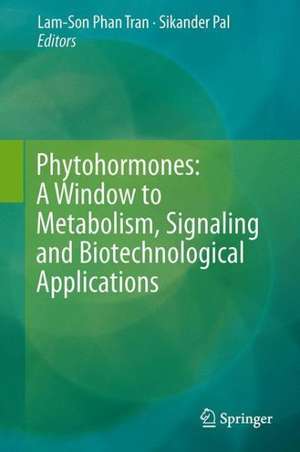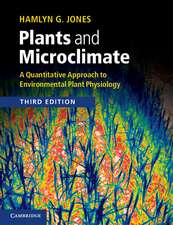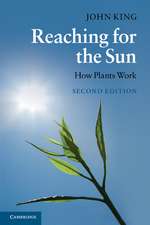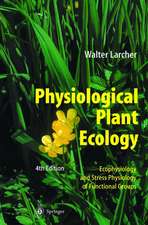Phytohormones: A Window to Metabolism, Signaling and Biotechnological Applications
Editat de Lam-Son Phan Tran, Sikander Palen Limba Engleză Hardback – 31 mar 2014
At the molecular level, phytohormonal crosstalks can be antagonistic or synergistic or additive in actions. Additionally, the signal transduction component(s) of one hormonal pathway may interplay with the signaling component(s) of other hormonal pathway(s). Together these and other research findings have revolutionized the concept of phytohormonal studies in plants. Importantly, genetic engineering now enables plant biologists to manipulate the signaling pathways of plant hormones for development of crop varieties with improved yield and stress tolerance.
This book, written by internationally recognized scholars from various countries, represents the state-of-the-art understanding of plant hormones’ biology, signal transduction and implications. Aimed at a wide range of readers, including researchers, students, teachers and many others who have interests in this flourishing research field, every section is concluded with biotechnological strategies to modulate hormone contents or signal transduction pathways and crosstalk that enable us to develop crops in asustainable manner. Given the important physiological implications of plant hormones in stressful environments, our book is finalized with chapters on phytohormonal crosstalks under abiotic and biotic stresses.
| Toate formatele și edițiile | Preț | Express |
|---|---|---|
| Paperback (1) | 948.29 lei 6-8 săpt. | |
| Springer – 22 aug 2016 | 948.29 lei 6-8 săpt. | |
| Hardback (1) | 959.98 lei 6-8 săpt. | |
| Springer – 31 mar 2014 | 959.98 lei 6-8 săpt. |
Preț: 959.98 lei
Preț vechi: 1170.71 lei
-18% Nou
Puncte Express: 1440
Preț estimativ în valută:
183.71€ • 199.49$ • 154.32£
183.71€ • 199.49$ • 154.32£
Carte tipărită la comandă
Livrare economică 22 aprilie-06 mai
Preluare comenzi: 021 569.72.76
Specificații
ISBN-13: 9781493904907
ISBN-10: 1493904906
Pagini: 376
Ilustrații: XI, 361 p. 38 illus., 28 illus. in color.
Dimensiuni: 155 x 235 x 20 mm
Greutate: 0.86 kg
Ediția:2014
Editura: Springer
Colecția Springer
Locul publicării:New York, NY, United States
ISBN-10: 1493904906
Pagini: 376
Ilustrații: XI, 361 p. 38 illus., 28 illus. in color.
Dimensiuni: 155 x 235 x 20 mm
Greutate: 0.86 kg
Ediția:2014
Editura: Springer
Colecția Springer
Locul publicării:New York, NY, United States
Public țintă
ResearchCuprins
1.Auxin in plant growth and stress responses.- 2.Abscisic acid implication in plant growth and stress responses.- 3.Cytokinin regulation of plant growth and stress responses.- 4.Roles of ethylene in plant growth and responses to stresses.- 5.Gibberellin implication in plant growth and stress responses.- 6.Brassinosteroids implicated in plant growth and stress responses.- 7.Salicylic acid and defense responses in plants.- 8.Jasmonates in plant growth and stress responses.- 9.Strigolactones: biosynthesis and functions in plant growth and stress responses.- 10.Phytohormonal crosstalk under abiotic stress.- 11.Plant hormone crosstalks under biotic stresses.
Notă biografică
Dr. Sikander Pal Assistant Professor, Department of Botany, University of Jammu, India.
Dr. Lam-Son Phan Tran, Unit Leader, Signaling Pathway Research Unit, RIKEN Center for Sustainable Resource Science, Japan.
Dr. Lam-Son Phan Tran, Unit Leader, Signaling Pathway Research Unit, RIKEN Center for Sustainable Resource Science, Japan.
Textul de pe ultima copertă
Abiotic and biotic stresses adversely affect plant growth and productivity. The phytohormones regulate key physiological events under normal and stressful conditions for plant development. Accumulative research efforts have discovered important roles of phytohormones and their interactions in regulation of plant adaptation to numerous stressors. Intensive molecular studies have elucidated various plant hormonal pathways; each of which consist of many signaling components that link a specific hormone perception to the regulation of downstream genes. Signal transduction pathways of auxin, abscisic acid, cytokinins, gibberellins and ethylene have been thoroughly investigated. More recently, emerging signaling pathways of brassinosteroids, jasmonates, salicylic acid and strigolactones offer an exciting gateway for understanding their multiple roles in plant physiological processes.
At the molecular level, phytohormonal crosstalks can be antagonistic or synergistic or additive in actions. Additionally, the signal transduction component(s) of one hormonal pathway may interplay with the signaling component(s) of other hormonal pathway(s). Together these and other research findings have revolutionized the concept of phytohormonal studies in plants. Importantly, genetic engineering now enables plant biologists to manipulate the signaling pathways of plant hormones for development of crop varieties with improved yield and stress tolerance.
This book, written by internationally recognized scholars from various countries, represents the state-of-the-art understanding of plant hormones’ biology, signal transduction and implications. Aimed at a wide range of readers, including researchers, students, teachers and many others who have interests in this flourishing research field, every section is concluded with biotechnological strategies to modulate hormone contents or signal transduction pathways and crosstalk that enable us to develop crops in asustainable manner. Given the important physiological implications of plant hormones in stressful environments, our book is finalized with chapters on phytohormonal crosstalks under abiotic and biotic stresses.
At the molecular level, phytohormonal crosstalks can be antagonistic or synergistic or additive in actions. Additionally, the signal transduction component(s) of one hormonal pathway may interplay with the signaling component(s) of other hormonal pathway(s). Together these and other research findings have revolutionized the concept of phytohormonal studies in plants. Importantly, genetic engineering now enables plant biologists to manipulate the signaling pathways of plant hormones for development of crop varieties with improved yield and stress tolerance.
This book, written by internationally recognized scholars from various countries, represents the state-of-the-art understanding of plant hormones’ biology, signal transduction and implications. Aimed at a wide range of readers, including researchers, students, teachers and many others who have interests in this flourishing research field, every section is concluded with biotechnological strategies to modulate hormone contents or signal transduction pathways and crosstalk that enable us to develop crops in asustainable manner. Given the important physiological implications of plant hormones in stressful environments, our book is finalized with chapters on phytohormonal crosstalks under abiotic and biotic stresses.
Caracteristici
International research experts present up-to-date perspectives on plant signaling pathways and crosstalk Mechanisms of actions of plant hormones in response to biotic and abiotic stresses Covers all major classes of plant hormones (auxins, cytokinins, abscisic acid, ethylene, gibberellin, brassinosteroid, salicylic acid, jasmonate and strigolactone) Includes supplementary material: sn.pub/extras








